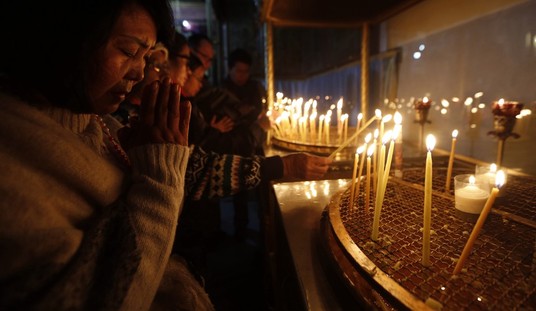Speaking of Russia, while the Soviet Union has fortunately been tossed onto the ash heap of history, life there is still no picnic, as the Boston Globe notes in two separate articles. First up, Cathy Young explores “Russia’s slow death of freedom”:
For the past several years, the Russian state under Vladimir Putin has been steadily working to bring the media to heel. In this stifling and intimidating atmosphere, [Anna] Politkovskaya, a correspondent for the semiweekly Novaya Gazeta, remained an outspoken critic of the Putin government. Much of her reporting focused on the war in Chechnya and the atrocities committed by the Russian military and the Russian-backed puppet regime of Chechen premier Ramzan Kadyrov. She had won numerous awards for her journalism, including the Amnesty International Global Award for Human Rights Journalism in 2001; her book, “Putin’s Russia: Life in a Failing Democracy,” was published in 2004.
At the time of her death, Politkovskaya was about to file a story about torture practices by Kadyrov’s security forces in Chechnya. It is unclear whether this article will ever see the light of day. It has been seized by the police along with her computer and her research materials.
Whoever was behind the murder (widely expected to remain unsolved, like the murders of more than a dozen other Russian journalists on Putin’s watch), the government’s reaction was revealing. Amidst an outpouring of grief from journalists, human-rights activists, and concerned citizens, no high-level government official attended Politkovskaya’s funeral. Putin waited several days to speak about the murder — and when he finally spoke, it was not to the Russian public or to the victim’s family or her colleagues, but to foreign leaders whose friendship he wants to retain, promising President Bush a thorough investigation of the crime.
“That alone,” human-rights activist Elena Bonner told Ekho Mosvky, Russia’s only remaining independent radio station, “is a slap in the face to all of Russia.” A few days later, on a visit to Germany, apparently under pressure from chancellor Angela Merkel, Putin made another statement — this time, a slap in the face to the dead woman herself. While he called her murder “a dreadful and unacceptable crime,” Putin also said that “she had minimal influence on political life in Russia” and added, “This murder does much more harm to Russia and Chechnya than any of her publications.” Thus, in one breath, the Russian president not only dismissed Politkovskaya’s work as insignificant but also branded it as harmful to her country.
Putin may worry about investigative journalists now conveniently deceased, but his nation has a surfeit of other crises–if not a surfeit of new births, as Kim Murphy notes:
Russia is the only major industrial nation that is losing population. Its people are succumbing to one of the world’s fastest-growing AIDS epidemics, resurgent tuberculosis, rampant cardiovascular disease, alcohol and drug abuse, smoking, suicide, and the lethal effects of unchecked industrial pollution.
In addition, abortions outpaced births last year by more than 100,000. An estimated 10 million Russians of reproductive age are sterile because of botched abortions or poor health. The public healthcare system is collapsing. And many parents in more prosperous urban areas say they can’t afford homes large enough for the number of children they would like to have.
The former Soviet Union, with about 300 million people, was the world’s third-most populous country, behind China and India. Slightly more than half of its citizens lived in Russia. The country has lost the equivalent of a city of 700,000 people every year since the collapse of the Soviet Union in 1991, only partially offset by an influx of people from other former Soviet republics. A country that sprawls across one-eighth of the globe is now home to 142 million people.
The losses have been disproportionately male. At the height of the power of the Soviet Union, its people lived almost as long as Americans. But now, the average Russian man can expect to live about 59 years, 16 years less than an American man and 14 less than a Russian woman.
As Mark Steyn wrote last year:
We are witnessing a remarkable event: the death of a great nation not through war or devastation but through its inability to rouse itself from its own suicidal tendencies.
And like North Korea, a nation that’s even more of a basket case, It probably won’t fade away quietly.










Join the conversation as a VIP Member